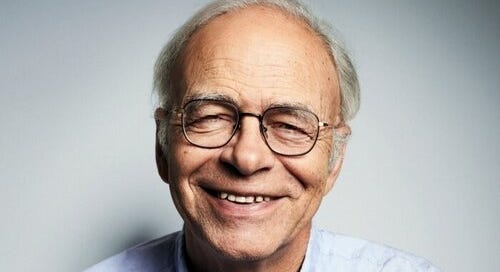After my debate with Peter Singer, I speculated that some version of the Noble Lie explained his apparent abandonment of extreme utilitarianism:
Singer seems to have completely abandoned the extreme view that we are morally obliged to give away all our surplus resources to the poor. Instead, he just pushed for a rough charity target of 10% of total income.
Singer reaffirmed his devotion to utilitarianism, but never explained why he drastically changed his mind about the morally obligatory level of donation.
I suspect the reason is that publicly defending the actual implications of utilitarianism alienates listeners, so a true utilitarian is morally obliged to conceal what true utilitarianism requires. In other words, you get better utilitarian results by misstating the implications of utilitarianism. Since utilitarianism puts no direct value on honesty, this is strangely not hypocritical.
Recently, a reader alerted me to the existence of this 2010 Peter Singer paper (co-authored with Lazari-Radek) on “Secrecy in Consequentialism” that strongly confirms my suspicions. The duo begin by explaining “some key tenets of esoteric morality”:
• There are acts which are right only if no one – or virtually no one – will get to know about them. The rightness of an act, in other words, may depend on its secrecy. This can have implications for how often, and in what circumstances, such an act may be done.
• Some people know better, or can learn better, than others what it is right to do in certain circumstances.
• There are at least two different sets of instruction, or moral codes, suitable for the different categories of people. This raises the question whether there are also different standards by which we should judge what people do.
• Though the consequentialist believes that acts are right only if they have consequences at least as good as anything else the agent could have done, the consequentialist may need to discourage others from embracing consequentialism.
• Paradoxically, it may be the case that philosophers who support esoteric morality should not do so openly, because as Sidgwick said: ‘it seems expedient that the doctrine that esoteric morality is expedient should itself be kept esoteric’ [ME, 490].
They approvingly remark:
The idea that it is better if some moral views are not widely known was not invented by Sidgwick. In Plato’s Republic, Socrates proposes that ordinary people be brought up to believe that everyone is born ‘from the earth’ into one of three classes, gold, silver or bronze, and living justly consists in doing what is in their nature. Only the philosopher-rulers will know that this is really a myth, a ‘noble lie’.
The paper’s thesis: “Esoteric morality is a necessary part of a consequentialist theory, and all of the points above can be defended.”
Most strikingly, Singer and Lazari-Radek apply this doctrine of secrecy to bite the bullet of the Forced Organ Donation hypothetical:
One of the most common objections to consequentialism is based on a hypothetical situation in which a surgeon has to do a delicate brain operation on a patient who happens to be the ideal organ donor for four other patients in the hospital, each of whom will die shortly unless they receive, respectively, a heart, a liver, and – for two of them – a kidney. The doctor is highly skilled, and is confident of her ability to carry out the brain surgery successfully. If she does, her patient will lead a more or less normal life.
But because the operation is a delicate one, no one could blame her, or have any reason to suspect anything, if the patient were to die on the operating table. Moreover, the hospital is experienced in organ transplantation, and the surgeon knows that if the patient were to die, the recipients of the patient’s organs would soon be able to go home and lead a more or less normal life. The surgeon knows no other details about her patient or the other patients, such as whether they are married, have children, or are about to discover a cure for cancer. In these circumstances, critics of consequentialism say, the consequentialist must think that the doctor ought to kill her patient, since in that way four lives will be saved, and only one lost, and this must be better than four dying and only one being saved. But, so the objection runs, it is obviously morally wrong for the surgeon to kill her patient, and any moral theory that says the contrary must be rejected.
We agree that the consequentialist must accept that, in these circumstances, the right thing for the surgeon to do would be to kill the one to save the four, but we do not agree that this means that consequentialism should be rejected. We think, on the contrary, that the appearance of unacceptability here comes from the fact that this is one of those rare cases in which the action is right only if perfect secrecy can be expected. Moreover, it is not an action that should be recommended to others.
If you’re still in doubt about Singer and the Noble Lie, they go on to say:
Yet at the same time the fact that it is children who we must educate in the moral principles society accepts imposes some limits on transparency. We need to give children reasons for acting in accordance with moral rules and principles that they can easily understand and reliably apply. This will limit the kinds of reasons we can give them. At an early age, we may offer them self-interested reasons, or we may simply tell them that ‘rules are rules’ and must be obeyed. If we are not deontologists of this simple sort, when we say this to children we are failing to be transparent with them. And it is certainly not true of every society that children are encouraged, as they mature, to reflect on and discuss the basis for these rules. We may be influenced by the consequences of inviting children to question the justification for obeying moral rules, and if the consequences are going to be sufficiently bad, we may condemn those who, like Socrates, encourage the young to question the basis of morality.
From this perspective, the same obviously goes for morally immature adults. Which, for a strict utilitarian, probably sum to 99%+ of humanity.
To repeat, in our debate, Singer disavowed his early extreme view that everyone who fails to donate all of their surplus wealth to the global poor is a wrong-doer. But he did so with no hint of an explanation. He definitely didn’t distance himself from utilitarianism or any of the factual premises behind his original argument. Given his explicit endorsement of esotericism - and his hard-line stance on the Forced Organ Donation hypothetical - the conclusion that Singer is feigning moderation for the greater good isn’t merely probable. It is all but certain.
P.S. You’re invited to tomorrow’s 12:30 PM lunch near Dartmouth College. Details here.
Subscribe to Bet On It
Caplan and Candor

















That's...kinda extremely horrifying. And exactly what C. S. Lewis in The Magician's Nephew and over 70 years later, Susana Clarke in Piranesi warn us about: "You mean that little boys ought to keep their promises. Very true: most right and proper, I’m sure, and I’m very glad you have been taught to do it. But of course you must understand that rules of that sort, however excellent they may be for little boys—and servants—and women—and even people in general, can’t possibly be expected to apply to profound students and great thinkers and sages. No, Digory. Men like me, who possess hidden wisdom, are freed from common rules just as we are cut off from common pleasures. Ours, my boy, is a high and lonely destiny.”
To which we, like Digory, should retort angrily: "That just means you think you can do whatever you want."
You say he has *appeared* to change his mind about it being morally obligatory to give to the point of marginal utility. But I don’t see that. It just seems that he has stopped emphasizing the obligatory, and instead emphasized the points of greatest leverage.
A utilitarian doesn’t think that doing what is obligatory matters in any distinctive way beyond any other equivalent improvement.
Non-utilitarians might think that the obligatory is all that matters, but utilitarians think that every improvement matters in proportion to how big it is, with the last improvement being no more important than others.